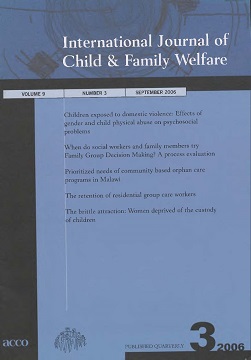When do social workers and family members try Family Group Decision Making? A process evaluation
Keywords:
Family Group Decision Making, Family Group Conferences, process evaluationAbstract
A Family Group Decision Making (FGDM) program attempted to divert children from foster care services and keep them within their extended families. Case characteristics of the referrals were used to explore which families were selected for FGDM, which families decided to try this approach, and which families then developed plans for keeping the children out of foster care. 593 referrals received over a five year period were coded for child, family, parent and maltreatment characteristics. Logistical regression identified case characteristics that were positively or negatively associated with decisions to use FGDM. Both child welfare professionals and family members independently chose to try FGDM more often in cases with identified kinship, parental substance abuse, improper supervision, and/or children with special needs. The findings suggest under which circumstances social workers and family members are willing to try to meet and share their concerns and suggestions in cases of child maltreatment.

